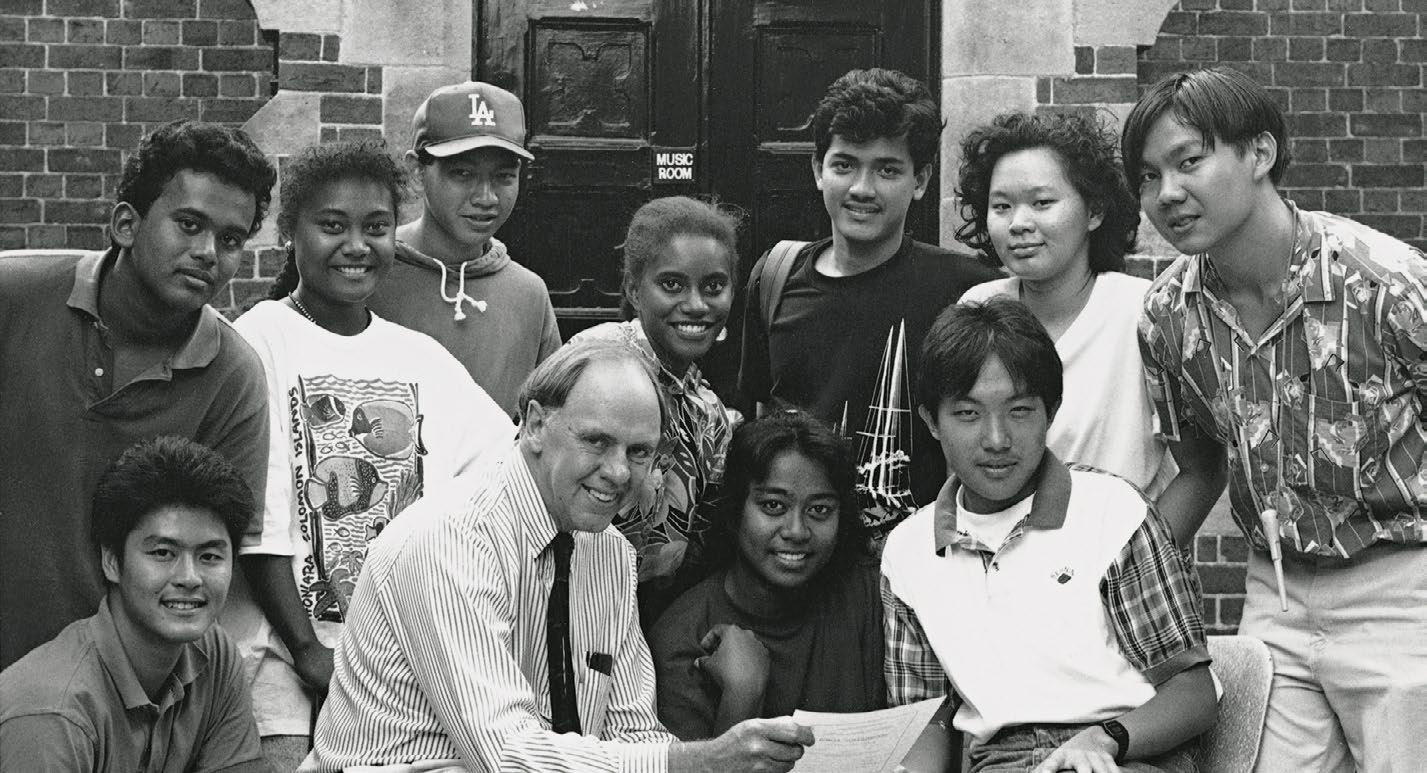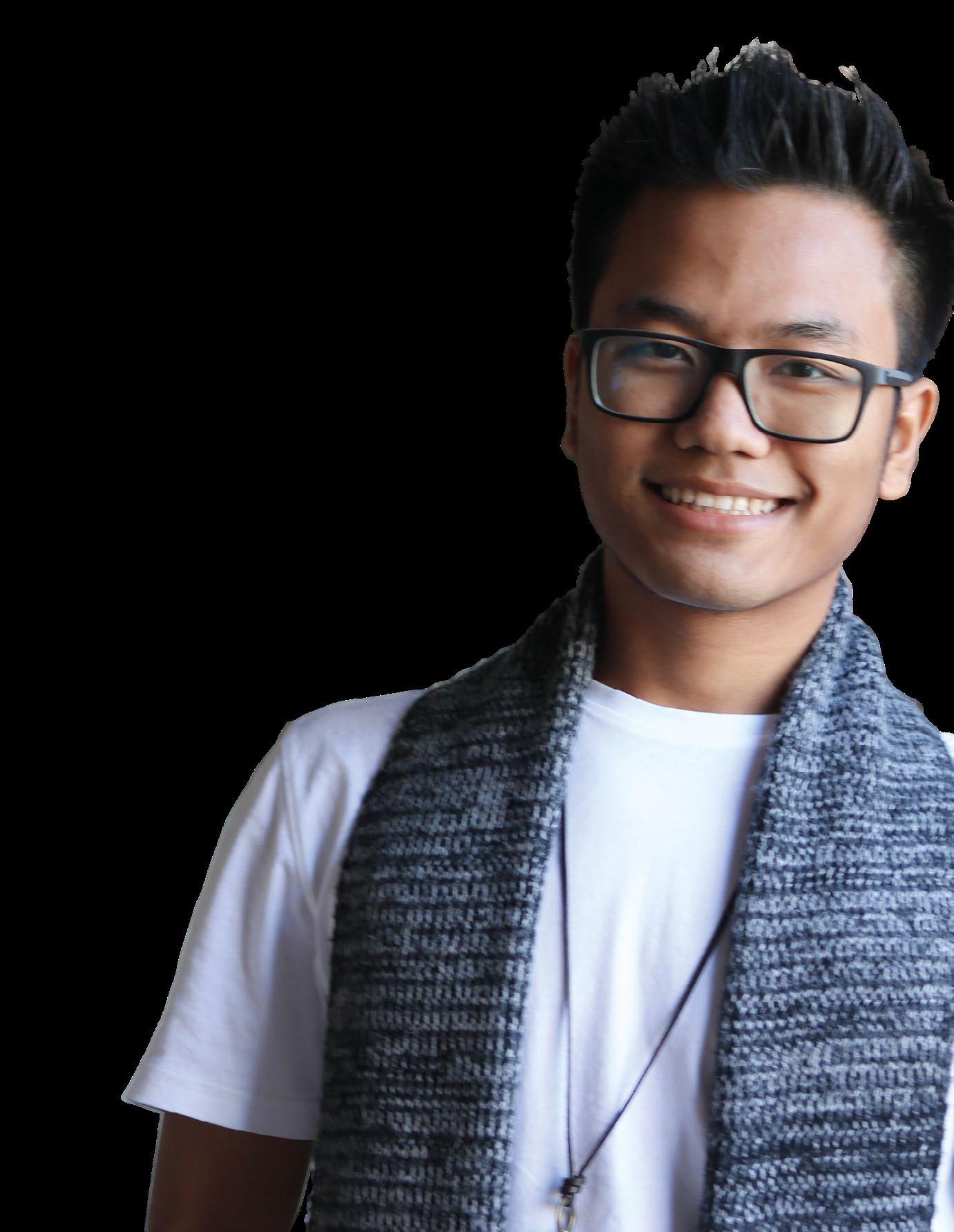
8 minute read
Celebrating 30 years of Foundation Studies
Trinity College opened the doors to its international school in 1990 – and, it’s safe to say, we haven’t looked back.
It may not be so obvious now, but starting a Foundation Studies program in the 1990s to help international students transition into the Australian university system was a major risk for Trinity. It was an untested model in Australia and the big question was: would it work?
Given the inherent risk involved, not everyone was on board with the idea. However, after much negotiation and effort, Trinity College in 1990 welcomed an initial cohort of around 100 international students to what was then known as the Trinity Education Centre.
The College’s flagship Foundation Studies program has since grown to accommodate more than 1000 students per year, with young people from all over the world choosing to study at Trinity, where we help prepare them for a successful tertiary education at the University of Melbourne and a fulfilling career thereafter.
With 2020 marking the program’s 30th anniversary, we decided to compile 30 stories to celebrate the program’s history and, most importantly, its people.
Here’s a recap of the staff, student and alumni stories we’ve shared throughout the year. For the full series, visit trinity.unimelb.edu.au/fs-30-years
DENIS WHITE: Setting FS up for success

Dr Denis White
Dr Denis White built a career around strategic planning, and he thought he’d better start planning as soon as possible after being appointed the second executive director of what was then known as the Trinity Education Centre (TEC) in 1990.
‘The relationship with the university was weak, our financial situation was weak,’ he says of his early days in the role. ‘But we had a good program and some very good teachers. So rather than look back and fix what had gone wrong, I decided to start afresh.’
Denis travelled to Malaysia and Singapore in search of students, seeking to engage their minds to the opportunities Foundation Studies afforded, especially the ‘pot of gold at the end of the rainbow’ that was Melbourne University.
Denis also understood the critical importance of maintaining a strong relationship with the University, so ensured Trinity had a robust selection he was attracted to an advertisement for process, good teaching and engaging courses. ‘What a university wants is good students. And if we could deliver them, the university would like us. That was how it turned out.’
Success took time, with student numbers growing slowly. The watershed period was the mid-1990s when Melbourne University actively sought more international students, and Trinity was in the right place to deliver. The program grew exponentially from there.
Denis had forged a career in academia after completing a master’s degree on the philosophy of Edmund Burke and a PhD on moral responsibility, looking at the conditions under which it’s appropriate to hold people morally responsible, although he admits: ‘I’ve largely forgotten what I thought those conditions were.’
He went on to teach politics at Monash University and, in 1980, after a ‘two-minute interview’ with Malcolm Fraser, became an adviser in the prime minister’s office, before ‘falling into’ the role of speechwriter. He eventually became director of Fraser’s office, which today would be titled chief of staff.
When the Coalition lost power in 1983, Denis returned to Monash but also set up a consultancy around the idea of strategic planning. ‘Strategies weren’t very popular at that time but I got interested in the question of why governments fail, and I thought it was because they weren’t very good at identifying key issues.’
It was while being in this mindset that he was attracted to an advertisement for TEC, especially given his insights into the sort of channels available to Asian students for studying in Australia, gained through his knowledge of the Colombo Plan acquired during his Fraser years.
When Denis left Trinity in 1998 after almost 10 years as executive director, Trinity’s Foundation Studies program was a recognised and respected international brand. Now, another 20-odd years later, Denis has written a book about his time at Trinity, provisionally titled The Magic of the Dream: A TEC Memoir 1988–1998.
TRANG DANG: Awakening Vietnam’s sleep industry

Trang Dang
Trang Dang (TCFS 2010) says that in her home country of Vietnam, sleep is almost considered a luxury. ‘We do not think about the quality of sleep we receive and how it can affect our life,’ she says.
Trang – a marathon runner – became tuned into the importance of a good mattress after injuring her back in 2017 and suddenly found sleep, or lack thereof, at the forefront of her mind. ‘Before that injury, I didn’t really care about mattresses or sleep because I never really had a problem with sleep.’
The injury prompted her to launch Ru9 – The Sleep Company with co-founder Vinh Nguyen. The company, which appeared on Vietnam’s version of Shark Tank, sells foam mattresses direct to consumers and educates people on the importance of sleep.
Trang says studying at Trinity equipped her with many of the analytical and problem-solving skills required to run a business. But more important than the subjects studied were the friendships she formed.
‘Some of my friends are still in Australia, while some have moved back to Singapore, Malaysia, China and Indonesia,’ she says. ‘We continue to help each other grow by sharing our expertise and giving each other advice.’
JED VAN DIN THANG: Sparking change through self-belief

Jed Van Din Thang
Hailing from Myanmar, Jed Van Din Thang (TCFS 2018, TC 2019) first moved to Australia with his family when his father was studying for a PhD in theology. He completed four years of school in Melbourne before returning to Myanmar, taking with him memories of an accommodating, friendly and multicultural city that he considered a second home. And so, when he was offered the opportunity to return to Melbourne and take part in Foundation Studies at Trinity many years later, he jumped at the chance.
Jed now lives on campus in Trinity’s Residential College and looks back fondly on his time in Foundation Studies – a formative period of making lifelong friendships and connections with people from around the globe.
During his Foundation Studies year, he got involved in the Young Christian Leadership Program, which seeks to create dialogue and understanding between Christian denominations, as well as the Pathways Liaison Committee, which aims to facilitate connections between Foundation Studies and Residential College students.
He went on to become publicity director for the University of Melbourne’s Myanmar Student Association and strengthened his Trinity connection by joining the Residential College community when he started university. In 2019, he claimed victory in one of Trinity’s oldest and most-beloved traditions, Juttoddie. For Jed, being the recipient of three scholarships – for both Trinity’s Foundation Studies and Residential College, as well as for the University of Melbourne – is a source of immense pride. Not only on a personal level, but also because he sees it as proof for those back home of what can be achieved through determination, hard work and self-belief.
‘I believe that anyone in this world can better themselves and can work to being in a better position than they are in, if they just have self-confidence and believe in their ability,’ he says. ‘I’m very proud to be able to show my people that we’re all created equally. It’s a great feeling to be able to take part in the dispelling of the notion that we are inferior.’
WAI HONG FONG: Discovering a new way of selling

Wai Hong Fong
Smart but lazy’ is a label affixed to many a misunderstood teen, thought to be whiling away talent through sheer indolence. In the case of Wai Hong Fong (TCFS 2002), Singapore’s rote learning-based education system did little to inspire a brain that thrived on problem solving and big-picture thinking, so his parents suggested he move to Australia, which he did.
After graduating from Trinity College and Melbourne University, Wai Hong began working for his uncle, trying to sell gifts on eBay. This exercise tapped into Wai Hong’s obsessiveness (previously channelled into video games) as he focused on cracking algorithms to get search engines to prioritise his products. Within a couple of years, the business was turning over $5 million in revenue.
In search of new products to sell, Wai Hong came across a telescope supplier whom he helped become one of Australia’s largest retailers of its kind both on and offline. ‘I figured out how to get the product in front of the right audience at scale and in a cost-effective way,’ he says.
Wai Hong later moved to China to study Mandarin and had a chance encounter with a lingerie retailer struggling with his computer system. Wai Hong investigated to find an outdated sales program, and few upgrade options on the market, so he decided to start his own online sales platform, StoreHub.
Narrowing in on the frustration being experienced by many retailers, he came up with a product now used by 14,000 retailers in more than 15 countries.
Through seeking out a challenge, Wai Hong has proven to his former teachers that he’s far from lazy. And with a multimillion-dollar business to run, he’s certainly not bored either.
CÍNTIA CHEN: Finding comfort in a challenge

Cíntia Chen
Cíntia Chen has moved around a lot. With ethnic ties to China, an upbringing in Brazil, her teenage years in Macao, and her university studies in Melbourne, she has been a part of multiple communities, cultures and international experiences.
Upon moving to Australia for Foundation Studies in 2009, she was determined to take advantage of the opportunities that college life offered but recalls feeling frustrated, going from a straight-A student in high school to struggling within a new academic milieu in her first year. It wasn’t easy, but she remembers making a conscious decision to step up. ‘Over the year, it became natural for me to look at a challenge and think, this is difficult – this means I must be learning something.’
Thanks to her tenacity and altered perspective, Cíntia went on to become one of the youngest managers in her community of practice and the first female consultant to be promoted to manager within her team at KPMG – one of the world’s biggest consulting companies, and chair of our Foundation Studies Alumni Advisory Committee (TFAN).
‘In the moment, when faced with challenges, it feels really hard. But I know that once I overcome them, I will look back and realise that I have climbed a mountain.’ Read the full article
Adapted from stories by Jeremy Bourke (Denis White), Nicole Thomson-Pride (Trang Dang), Juliet Mentor (Jed Van Din Thang), Emily McAuliffe (Wai Hong Fong), Blanca Brew Ferrer (Cíntia Chen).










